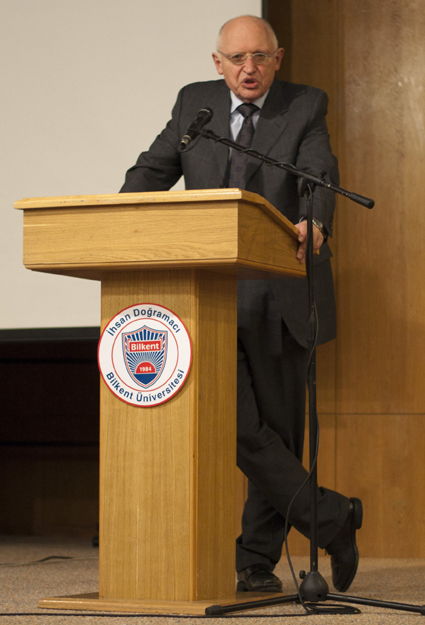Günter Verheugen Discusses Foreign Policy at Bilkent
 Former Vice-President of the European Commission for Enterprise and Industry Günter Verheugen visited Bilkent on Wednesday, November 16 and met with Bilkent students to give a seminar titled "Turkish Foreign Policy and the European Union in the Aftermath of the Arab Spring."
Former Vice-President of the European Commission for Enterprise and Industry Günter Verheugen visited Bilkent on Wednesday, November 16 and met with Bilkent students to give a seminar titled "Turkish Foreign Policy and the European Union in the Aftermath of the Arab Spring."
Born in 1944, Günter Verheugen is a German politician who studied history, sociology and politics in Cologne and Bonn. After his retirement as member of the European Commission he joined the academic community and is now a professor at the European University Viadrina in Frankfurt.
In his talk Mr. Verheugen discussed topics such as the relationships between Turkey and the Arab world, between the EU and the Arab world, and between Turkey and the EU, as well as the EU's neighborhood policy.
continue reading
Elections for Department Representatives Start Today!
Tuesday, November 22, marks the first round of elections for Department Representatives to Student Council.
Eligible students are strongly encouraged to vote. Voting will be done electronically, from 10 a.m. to
5 p.m.
The names and photos of the candidates for each department are posted at www.bilkent.edu.tr/konsey.
You can vote at any of the locations listed below, no matter what your department is, and you need only to have your student ID card with you.
Remember to Vote for Your Department Representative Today
Locations of Voting Stations
continue reading
Sean McMeekin Receives Book Award
 Asst. Prof. Sean McMeekin of the Department of International Relations has been honored with a book award from the Association for Slavic, East European and Eurasian Studies (ASEEES).
Asst. Prof. Sean McMeekin of the Department of International Relations has been honored with a book award from the Association for Slavic, East European and Eurasian Studies (ASEEES).
ASEEES is the leading private, nonprofit organization dedicated to the advancement of knowledge about Russia, central Eurasia and eastern and central Europe. On November 19, 2011, during its 43rd annual convention held at the Omni Shoreham hotel in Washington, DC, the organization presented its annual awards for distinguished contributions to area studies, eight book prizes, two outstanding doctoral dissertation prizes, a graduate student essay contest prize, and one prize for librarianship.
Asst. Prof. McMeekin was presented with the Barbara Jelavich Book Prize, which is given annually for a distinguished monograph published on any aspect of southeast European or Habsburg studies since 1600, or 19th- and 20th-century Ottoman or Russian diplomatic history. This year, it was awarded for Asst. Prof. McMeekin's book, "The Berlin-Baghdad Express: The Ottoman Empire and Germany’s Bid for World Power 1898-1918" (Belknap/Harvard University Press).
IAED Graduate Wins UAE Design Competition
.jpg) Bersun Ertürk, a 2003 graduate of the Department of Interior Architecture and Environmental Design, has recently received an award for a product design in a competition held by the Association of Interior Designers (APID) in the UAE. Mr. Ertürk, who has lived and worked in Dubai, UAE, for the past five years, designed a coffee table, which won top honors in the competition.
Bersun Ertürk, a 2003 graduate of the Department of Interior Architecture and Environmental Design, has recently received an award for a product design in a competition held by the Association of Interior Designers (APID) in the UAE. Mr. Ertürk, who has lived and worked in Dubai, UAE, for the past five years, designed a coffee table, which won top honors in the competition.
Designs in the competition were to be for an article of furniture, product or material for use in an interior setting, and were required to represent or interpret a theme specific to the region. The designers of the top ten submissions were then asked to submit manufactured prototypes. After being judged by a jury and voted on by members of the APID, Mr. Ertürk's design received the platinum award, or first prize. 
The designer named his design "LOCT" -- a combination of "locked" and "octagon" - to indicate its structural form, based on an eight-sided figure and supported by interlocking legs. As Mr. Ertürk notes, the solid teak legs "create the structure of this freestanding piece, which becomes locked through gravity." He says that although the table appears simple, "the joint details are unique, and it took a long time to achieve perfection in the prototype."
The design reflects the regional theme by focusing on family, "a keystone value of the region, coming from the traditional culture." It is an abstract representation of the way family members support each other, and also uses a simplified version of the traditional octagonal mashrabiya pattern.
Former Vice-President of the European Commission for Enterprise and Industry Günter Verheugen visited Bilkent on Wednesday, November 16 and met with Bilkent students to give a seminar titled "Turkish Foreign Policy and the European Union in the Aftermath of the Arab Spring."

.jpg)